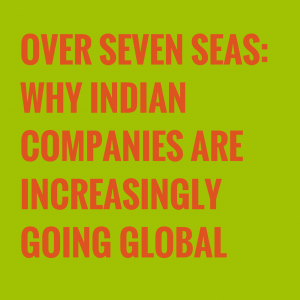I predict starting 2016, we will hear $3-4 billion product companies coming out of India every year.
 The startup ecosystem has come a long way in the country, especially in the last decade or so. People often ask me at various forums and events as to where I see the startup ecosystem heading in the coming years. While it may be difficult to predict precisely, there are perceptible changes.
The startup ecosystem has come a long way in the country, especially in the last decade or so. People often ask me at various forums and events as to where I see the startup ecosystem heading in the coming years. While it may be difficult to predict precisely, there are perceptible changes.
While the turn of the century was about the rise of the Indian services and outsourcing industry, I believe today it’s about the product companies. The rise of the product startups in the country has been due to numerous reasons, but the stellar growth has only made things exciting.
One of the reasons for the mushrooming of product companies is due to people returning from overseas after they have sensed an opportunity. They want to build a product that addresses the market opportunity. When I returned from the US, I saw some clear patterns and opportunities that I could work on. While one choice was to work with existing companies in the travel and tourism space, the other was to create a brand. I chose to go with the former.
The second clear reason is that people no longer want to do back office work for the world. For example, a lot of companies in the space of analytic work around identifying patterns and ideas for companies that outsource work to them. You will see a lot of individuals from these companies building a product start-up around same principles.
This is the natural progression and evolution of an industry. Outsourcing gained prominence because of cost arbitrage and then the IT companies started getting innovative to increase their share of the pie. They started advising various companies on how they should re-engineer their business processes and additional things they could do.
Phase 1 was about moving cost offshore and labour arbitrage while Phase 2 was making it efficient and optimising it. Indian outsourcing companies started evolving their services by providing additional services and at the same time automating it and making it non-linear to people.
The natural progression after that is if employee of these IT companies were advising clients on how to make their business processes better and how to “go to market” more efficiently, what prevents them from going to market on their own? You will see a lot of companies that are an offshoot of big IT establishments. You see individuals go out and address markets problems and opportunities rather than work for someone else.
Carpe Diem
Moreover, the services company has allowed people with similar ambitions to come together and seize the moment. Services companies have become the place where co-founders have met and most of the time the early hires in a startup are from these services companies. When there was a lot of movements around outsourced product management where companies outsourced their engineering work to India, it was obvious that employees from these services companies would get together and start a product company of their own.
The overall IT industry has evolved and the entrepreneurial ecosystem has been built to some extent and has gained velocity. According to Grant Thornton India, PE investments in India amounted to $1.7 billion last month, taking the overall PE deal tally to $10.2 billion in the first 10 months of this year. Spread across 500 PE deals, investments are up 18 per cent in value terms and 37 per cent in terms of number of deals in 2013. The entire investment community, access to capital and breadth of funds have increased quite dramatically.
The appeal of being a part of a product company is far cooler and hipper, rather than being a part of an IT services firm. For an aspiring entrepreneur, the IT services story has been beaten to death. No one wants to start another company in the outsourcing space and given the number of successful product companies like Druva, InMobi and Zoho, people now have role models. As entrepreneurs see billion dollar companies are now possible in the product space, it serves as fuel to the entrepreneurial fire. An aspiring entrepreneur wants to build a product company that will address a global market need.
Role of Industry Bodies
Industry bodies are also playing their part. Bodies like Nasscom have a separate Product Council and Product Conclave, which brings together a good collection of product companies in the form of peer-to-peer learning and experiences. Another body that is doing a good job is iSPIRT that has some big initiatives. It puts a big focus on the M&A connects where they look to enable big US tech companies to connect to a lot of Indian start-ups. Hence, we have seen a bunch of startups like Little Eye Labs and few others being acquired.
iSPIRT is providing a platform that enables big tech companies to acqui-hire, which essentially is acquiring a startup to get access to their talent. This helps both sides – buyers that know they can do a deal in India and integrate startups effectively and for the startup a viable exit route even if it’s not in a revenue generating state. It is also extremely focused on peer-to-peer learning of product companies. From newsletters from founders and experts to roundtable interactions, the body looks to bring curated number of entrepreneurs to come and share experience of selling globally.
Nothing succeeds better than success and the early successes of various product companies have set the stage as role models. Once the momentum builds it breaks the inertia in the system. I predict starting 2016, we will hear $3-4 billion product companies coming out of India every year. In that sense, 2015 will play an important role in ironing out structural issues in the system and ensuring the ease of doing business is improved.


 While there are no numbers or research on how many Indian startups have global operations, I suspect it will be a sizeable number – a number that is growing every month and every year. No longer are Indian startups content in serving merely the domestic market, this new breed of startups and entrepreneurs consider the world as their market.
While there are no numbers or research on how many Indian startups have global operations, I suspect it will be a sizeable number – a number that is growing every month and every year. No longer are Indian startups content in serving merely the domestic market, this new breed of startups and entrepreneurs consider the world as their market.